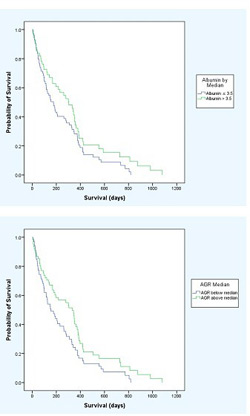|
|
Back to 2014 Annual Meeting Posters Negative Impact of Elevated Pre-Treatment Albumin/Globulin Ratio on Survival in Pancreatic Cancer Patients With Normal Serum Albumin Basem Azab*, Ariful Alam, Masood a. Shariff, Wolf K. Von Waagner, Antonio I. Picon, Scott W. Bloom Surgery, Staten Island University Hospital, Staten Island, NY
Background: Albumin globulin ratio (AGR) is an inflammatory marker that was found to predict survival in breast and colorectal cancer patients. The aim of our study was to assess the predictive value of pretreatment AGR in terms of survival in pancreatic cancer patients. Methods: A retrospective study of a prospectively maintained database of 367 pancreatic cancer patients treated between January 2004 and December 2011. Exclusion criteria included those with hemoproliferative disorders, chronic liver disease, patients with serum albumin < 3gm/dl, or unavailable comprehensive metabolic panel before treatment (i.e. surgery/chemotherapy). Survival status was obtained from our cancer registry and social security death index. Patients were divided according to their median serum albumin (3.5gm/dl) and AGR (1.18) values. Results: Total of 133 patients were qualified for the study. There were 57 patients underwent pancreatectomy and 76 received chemotherapy. According to Kaplan Meier survival curves, the patients with lower AGR (=< 1.18) had statistical significant poor survival compared to those with AGR > 1.18 (p=0.028), whereas the lower albumin group (=<3.5gm/dl) showed a trend of poor survival compared to those with albumin > 3.5gm/dl (p=0.068) (Figure 1) . Conclusion: An elevated pretreatment AGR is a significant predictor of poor survival in pancreatic cancer patients among patients with normal serum albumin. Back to 2014 Annual Meeting Posters |
||||||||||
© 2026 Society for Surgery of the Alimentary Tract. All Rights Reserved. Read the Privacy Policy.


